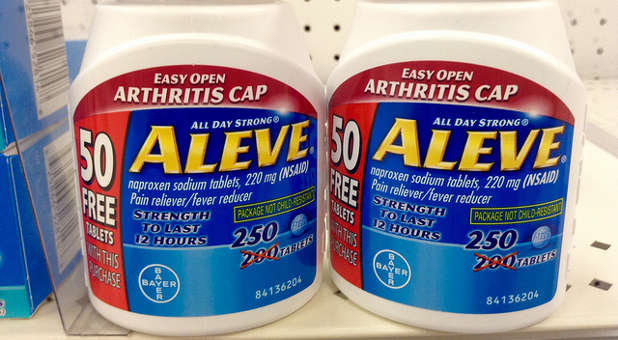An announcement by the Food and Drug Administration (FDA) explains a new requirement that over-the-counter (OTC) and prescription painkillers within the family of aspirin have a warning on the label.
The warning must explain that even the short-term use of the medication in question increases one’s risk of strokes and heart attacks, even among individuals who are not facing the common risk factors associated with cardiovascular disease.
The new FDA warning labels will be applied to all medications that fall under the umbrella category of non-steroidal anti-inflammatory drugs or NSAIDs. The only exception that will not be forced to carry such a warning on its label is aspirin. Leading over-the-counter medications, all of which are non-aspirin products or NSAIDs, will carry the warning of potential health risks: Such brands include Celebrex, Aleve, and Motrin. Millions of Americans take the latter drugs each year.
The newest studies have experts asserting that even in minute amounts, NSAIDs can prove deadly. As Northwestern University’s Bruce Lambert asserts, the warning label, while clear about its direct assertions in relation to cardiovascular health threats, will also carry the underlying message that there are safe pain relief medicines.
In the FDA’s recent announcement pertaining to the potential danger of NSAID use, the organization also explains that such OTC medications have had a warning on the box for the past ten years explaining the risk of stroke or heart attack. The newer labeling regulations put an emphasis on the dangers and intensify the severity of the health warnings.
According to experts conducting the latest research, within weeks of starting such medications, the risk of stroke or heart failure increases, and this is true even for people who have no cardiovascular related health issues prior to the use of NSAIDs. Of course, if the individual does have cardiovascular related conditions prior to NSAID use, the risk of stroke or heart attack is that much greater. What’s more and even worse is the fact that individuals who received NSAIDs for pain after having a heart attack were more likely to die within the year following the heart attack than those individuals who had not received such drugs.
New labeling regulations will also make it clear that the higher the dosage one takes, the higher the health risks. The label will explain how different medications come with varying risks, but at this time, there is no distinction as to which medications are the riskiest to consume. Presently, the potential variations and associated health risks are still under investigation.
A panel of experts evaluated the information pertaining to heart health risks and the use of NSAIDs. On the panel was a professor of medicine and public health from Emory University, Peter Wilson, who explains the potential dangers based on percentages. For those using the lowest dose possible of over the counter NSAIDs, the increase of potential for cardiovascular problems or stroke is 10 percent. If consuming low prescription doses of the medication, the risk doubles to 20 percent.
If the individual is taking prescription medication with elevated doses, the risk of stroke or cardiovascular problems increases dramatically up to 50 percent. The risks are particularly bad for the elderly aged 65 or older or others who have existing cardiovascular issues. The primary worry is that consumers see OTC pain meds as benign, and there is an incredible likelihood that they are not benign at all.
Such medications are ideal for those individuals who are young, healthy, without cardiovascular problems, and good for short-term usage only. Such medications are no longer recommended for the treatment of minor aches and pains.
Don Colbert, M.D. has been board-certified in Family Practice for over 25 years and practices Anti-aging and Integrative medicine. He is a New York Times Bestselling author of books such as The Bible Cure Series, What Would Jesus Eat, Deadly Emotions, What You Don’t Know May be Killing You, and many more with over 10 million books sold. He is the Medical Director of the Divine Health Wellness Center in Orlando, Florida where he has treated over 50,000 patients.
For the original article, visit drcolbert.com.
See an error in this article?
To contact us or to submit an article





















